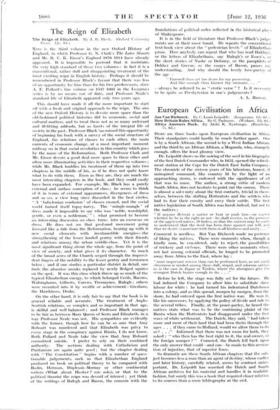The Reign of Elizabeth
Tins is the third Volume in the new Oxford History of England, in which Professor G. N. Clark's The Later Stuarts and Mr. R. C. K. Ensor's England 1870--1914 have already appeared. It is impossible to pretend that it maintains the very high standard of those two volumes ; in fact it is a conventional, rather dull and disappointing treatment of the most exciting reign in English history. Perhaps it should be remembered in Professor Black's favour that there was less of an opportunity for him than for his two predecessors, since A. F. Pollard's fine volume on 1547-1603 in the Longman series is by no means out of date, and Professor Neale's standard life of Elizabeth appeared only two years ago.
This should have made it all the more important to start off with a fresh and original approach to the reign. The aim of the new Oxford History is to devote more space than the old-fashioned political histories did to economic, social and cultural matters, and to treat them not as so many awkward and ill-fitting addenda, but as facets of the integral life of society in the past. Professor Black has missed this opportunity of beginning his book with a survey of the social structure of England, the relations of classes to each other, the main currents of economic change, at a most important moment midway on in that social revolution in this country which goes by the name of the Reformation. Both Professor Clark and Mr. Ensor devote a good deal more space to these other and often more illuminating activities in their respective volumes ; while Mr. Black huddles his treatment of them up into two chapters in the middle of his, as if he does not quite know what to do with them. Even as they are, they arc much the most interesting chapters in the book, and they could easily have been expanded. For example, Mr. Black has a purely external and surface conception of class ; he seems to think of it in terms of external appearances, divergences of dress and so on, a view long since discarded in the best circles. " A babylonian confusion ' of classes ensued, and the social world turned itself topsy-turvy. The ' mingle-mangle' of dress made it impossible to say who was ' noble, worshipful, gentle, or even a nobleman,' " : what promised to become an interesting discussion on class turns into an excursus on dress. He does not see that profound movement going forward like a tide from the Reformation, bearing up with it new social elements with inexhaustible energies—the strengthening of the lesser landed gentry with their friends and relations among the urban middle-class. Yet it is the most•significant thing about the whole age, from the point of view of society, and what gives it its character. So much of the broad acres of the Church seeped through the improvi- dent fingers of the nobility to the lesser gentry and townsmen below ; and if one studies a particular district in detail, one finds the absentee monks replaced by newly fledged squires on the spot. It was this class which threw up so much of the typical Elizabethan energy, to which belonged Cecils, Bacons, Walsinghams, Gilberts, Carews, Tremaynes, Ralegh ; others were recruited into it by wealth or achievement—Gresham, the Hawkinses, Drake.
On the other hand, it is only fair to say that the book is in general reliable and accurate. The treatment of Anglo- Scottish relations, so complex and so important in that age, is skilful and well balanced ; and Profeasor -Black manages to be fair as between Mary Queen of Scots and Elizabeth, in a way Professor Neale was not. His sympathies are evidently with the former, though how he can. be so sure that Amy Robsart was murdered and that Elizabeth was privy to every stage in the conspiracy against Rizzio, I do not know. Both Pollard and Neale take the view that Amy Robsart committed suicide. I prefer to rely on their combined authority. The sections dealing with Catholicism and Puritanism are again quite good ; but the chapter dealing with The Constitution " begins with a number of ques- tionable judgements, such as that Elizabethan England produced no book on political theory to be compared with Bodin, Hotman, Duplessis-Mornay or other continental writers (What about Hooker ? one asks), or that to the political theorist the reign was devoid of interest ; yet think of the writings of Ralegh and Bacon, the concern with the foundations of political order reflected in the historical plays of Shakespeare.
It is in the field of literature that Professor Black's judge.. ments are at -their most banal. He repeats the conventional text-book view about the " pedestrian levels " of Elizabethan prose. How anybody can repeat that who has read Hakluyt, or the letters of Elizabethans, say Ralegh's or Essex's, or the short stories of Nashe or Deloney, or the pamphlets of Dekker and Greene, or the essays of Bacon, passes my understanding. And why should the lovely love-poetry of the age-
" Farewell thou art too deare for my possessing,
And like enough thou knowst thy estimate. . . ."
—always be referred to as " erotic verse " Is it necessary to be quite so Presbyterian in one's judgements ?
A. L. Rowe.






















































 Previous page
Previous page